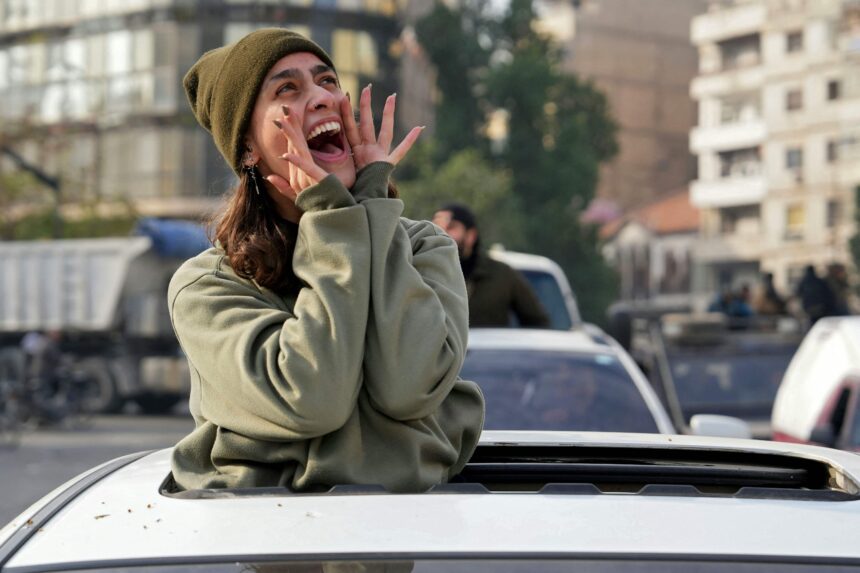DAMASCUS – Islamist-led rebels took Damascus yesterday after a lightning offensive, sending President Bashar al-Assad fleeing and ending five decades of Baath party rule in Syria.
Residents in the capital were seen cheering in the streets as the rebel factions heralded the departure of “tyrant” Assad, saying: “We declare the city of Damascus free.”
AFPTV images from Damascus showed rebels firing into the air at sunrise, with some flashing the victory sign and crying “Allahu akbar”, or “God is greatest”.
Some people climbed atop a tank in celebration, while others battered a toppled statue of Assad’s father, Hafez.
“I can’t believe I’m living this moment,” tearful Damascus resident Amer Batha told AFP by phone.
“We’ve been waiting a long time for this day,” he said, adding: “We are starting a new history for Syria.”
Assad’s reported departure comes less than two weeks after the Islamist Hayat Tahrir al-Sham (HTS) group challenged more than five decades of Assad family rule with a lightning offensive. “After 50 years of oppression under Baath rule, and 13 years of crimes and tyranny and (forced) displacement… we announce today the end of this dark period and the start of a new era for Syria,” the rebel factions said on Telegram.
Prime Minister Mohammed al-Jalali said he was ready to cooperate with “any leadership chosen by the Syrian people”.
The head of war monitor, the Syrian Observatory for Human Rights, Rami Abdel Rahman, told AFP: “Assad left Syria via Damascus international airport before the security forces left” the facility.
AFP was unable to immediately confirm the report. HTS said their fighters broke into a jail on the outskirts of Damascus, announcing an “end of the era of tyranny in the prison of Sednaya”, which has become a by-word for the darkest abuses of Assad’s era.
The rapid developments came just hours after HTS said it had captured the strategic city of Homs.
Syria’s defence ministry earlier denied that rebels had entered Homs, describing the situation there as “safe and stable”.
Homs is about 140 kilometres from the capital and was the third major city seized by the rebels, who began their advance on 27 November, reigniting a years-long war that had become largely dormant.
US President Joe Biden was keeping a close eye on the “extraordinary events” unfolding in Syria, the White House said.
The Britain-based Observatory confirmed “the doors of the infamous ‘Sednaya’ prison… have been opened for thousands of detainees who were imprisoned by the security apparatus throughout the regime’s rule”.
Assad’s government had previously denied the army had withdrawn from areas around Damascus.
His rule has for years been backed by Lebanese group Hezbollah, whose forces “vacated their positions around Damascus”, a source close to it said early yesterday.
Reports that Assad had fled were followed by the premier saying he was ready to “cooperate” with a new leadership and any handover.
“This country can be a normal country that builds good relations with its neighbours and the world… but this issue is up to any leadership chosen by the Syrian people,” Jalali said in a speech broadcast on his Facebook account.
Rebel factions aired a statement on Syrian state television, saying they had toppled the “tyrant” Assad and urged fighters and citizens to safeguard the “property of the free Syrian state”.
State TV later broadcast a message proclaiming the “victory of the great Syrian revolution”. AFP has been unable to independently verify some of the information provided by the government and the rebels.
Before the announcements, Damascus residents had described to AFP a state of panic as traffic jams clogged the city centre, with people seeking supplies and queueing to withdraw money.
But yesterday morning saw chants and cheering, with celebratory gunfire and shouts of “Syria is ours and not the Assad family’s”.
At the dawn call to prayer, some mosques broadcast religious chants usually reserved for festive occasions, while also urging residents to stay at home.
Before the rebels entered Damascus, the Islamist-led alliance had wrested control of Aleppo, Hama and also Homs, known during the early years of the civil war as the “capital of the revolution”.
The Observatory said Daraa, cradle of the 2011 uprising, also fell from government control.– Nampa/AFP



